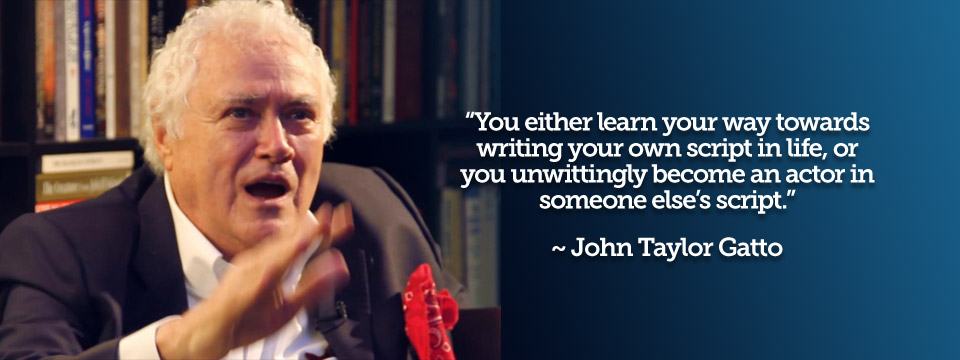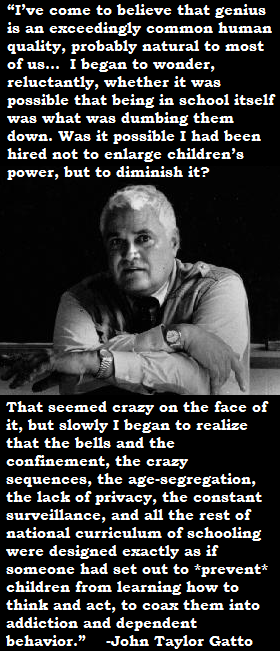Met de komst van het internet en de overvloed aan kennis die voor iedereen opeens toegankelijk is, is het handig om eens te kijken of het niet de hoogste tijd wordt ons onderwijs systeem aan te passen aan die nieuwe omstandigheden.
De wereldwijd meest bekeken TED Talk is van Ken Robinson en hij constateert dat ons onderwijs systeem de creativiteit van kinderen binnen een aantal jaar totaal heeft doodgeslagen. Zijn TED Talk, met inmiddels over de 28 miljoen views heeft dan ook de toepasselijke naam: How schools kill creativity. Je kunt Nederlandse ondertitels aanzetten bij de TED Talk.
En Ken Robinson is niet de enige criticus van ons onderwijs systeem. John Taylor Gatto werd zelf drie jaar achtereen verkozen tot beste onderwijzer van New York en nam daarna ontslag omdat volgens hem het onderwijsysteem zelf de grootste barrière is voor een gezond en geschikt leerpad voor kinderen.
Hij geeft aan dat je kinderen hun inherente interesses serieus moet nemen en ze daarin moet ondersteunen en ze in staat moet stellen vooruitgang te maken in die gebieden. Moeilijker is het niet volgens Gatto en hij heeft hier buitengewoon grote successen mee geboekt.
Hij zet zijn interessante visie uiteen in een paar uur durend interview wat een waardering van 9.3 heeft op de IMDB, onder de titel: De waarheid over ons onderwijssysteem.
En een derde persoon die duidelijke kritiek heeft op ons huidige staatsonderwijssysteem wat is vormgegeven aan de hand van het zogenaamde pruissische onderwijssysteem is Larken Rose. Schijver van onder meer het boek: Het meest gevaarlijke (bij)geloof. Hij claimt dat onderwijs naast rekenen en taal vooral ook blinde gehoorzaamheid traint aan autoriteiten, hij vat in dat boek zijn kritiek op ons onderwijssysteem wel aardig samen in het volgende stuk:
Teaching Blind Obedience
The purported purpose of schools is to teach reading, writing, mathematics, and other academic fields of thought. But the message that institutions of “education” actually teach, far more effectively than any useful knowledge or skills, is the idea that subservience and blind obedience to “authority” are virtues. Simply consider the environment in which the majority of people spend most of their formative years.
Year after year, students live in a world in which: • They receive approval, praise and reward for being where “authority” tells them to be, when “authority” tells them to be there. They receive disapproval, reproach and punishment for being anywhere else. (This includes the fact that they are coerced into being in school to begin with.)
• They receive approval, praise and reward for doing what “authority” tells them to do. They receive disapproval, reproach and punishment for doing anything else, or for failing to do what “authority” tells them to do.
• They receive approval, praise and reward for speaking when and how “authority” tells them to speak., and receive disapproval, reproach and punishment for speaking at any other time, in any other way, or about any subject other than what “authority” tells them to speak about, or for failing to speak when “authority” tells them to speak.
• They receive approval, praise and reward for repeating back whatever ideas the “authority” declares to be true and important, and receive disapproval, reproach and punishment for disagreeing, verbally or on a written test, with the opinions of those claiming to be “authority,” or for thinking or writing about subjects other than what “authority” tells them to think or write about.
• They receive approval, praise and reward for immediately telling “authority” about any problems or personal conflicts they encounter, and receive disapproval, reproach and punishment for trying to solve any problems or settle any disagreements on their own.
• They receive approval, praise and reward for complying with whatever rilles, however arbitrary, “authority” decides to impose upon them. They receive disapproval, reproach and punishment for disobeying any such rules. These rules can be about almost anything, including what clothes to wear, what hairstyles to have, what facial expression to have, how to sit in a chair, what to have on a desk, what direction to face, and what words to use.
• They receive approval, praise and reward for telling the “authority” when another student has disobeyed “the rules,” and receive disapproval, reproach and punishment for failing to do so.
The students clearly and immediately see that, in their world, there are two distinct classes of people, masters (”teachers”) and subjects (”students”), and that the rules of proper behavior are drastically different for the two groups. The masters constantly do things that they tell the subjects not to do: boss people around, control others via threats, take property from others, etc.This constant and obvious double standard teaches the subjects that there is a very different standard of morality for the masters than there is for the subjects. The subjects must do whatever the masters tell them to, and only what the masters tell them to, while the masters can do pretty much anything they want.
Na deze kritieken op het onderwijs systeem te hebben bekeken de vraag hoe we het onderwijs systeem van nu dan beter zouden kunnen inrichten? Hoe kunnen we kinderen hun creativiteit laten behouden zoals Ken Robinson wil? Hoe kunnen we onderwijs meer afstellen op de persoonlijke interesses van kinderen en hun juist op die punten verder helpen zoals John Taylor Gatto wil? En hoe kunnen we kinderen meer vrijheid geven en minder slaafs maken zoals Larken Rose wil?
Met de huidige technieken zoals het internet en de overvloed aan kennis die daarmee voor elk persoon op bijna elk momente toegankelijk is geworden zou een paradigmashift in het onderwijssysteem mogelijk moeten zijn. Laten we eens proberen te verkennen hoe zo een paradigma shift eruit zou kunnen zien.
Hoe denken mensen hier over ons huidige onderwijssysteem en hoe kunnen we dat volgens mensen hier verbeteren. Alle input en ideeen zijn van harte welkom.
Aanverwante artikelen en informatie:
-) TED Talk, Ken Robinson – How schools kill creativity
-) De waarheid over ons onderwijssysteem met John Taylor Gatto
-) Het meest gevaarlijke (bij)geloof met Larken Rose
-) Online gratis onderwijs, een overzicht
-) Wikipedia – Prussian Education System





Er zijn trouwens al aardig wat websites die gratis educatie aanbieden.
https://www.khanacademy.org/
“The Khan Academy” is bijvoorbeeld al een zeer goede website waar je kinderen vrij kunnen leren. Een digitaal schoolbord en een iemand die het op een leuke en goede manier met veel beeldvorming uitlegd. (de Nederlandse site wordt nog hard aan gewerkt. Alles wordt vertaald)
Dr zijn ook vele websites of YouTube kanalen die goede en specefieke opleidingen voor volwassenen aanbieden zoals:
Free Course material from M.I.T.: http://ocw.mit.edu/index.htm
Free Course material from Yale :http://oyc.yale.edu/
Free Course material from Berkeley: http://webcast.berkeley.edu/series.html#c,s
http://universityofreddit.com/
https://iversity.org/courses
http://videolectures.net/
http://www.allversity.org/
Take part in a huge variety of interesting studies of nature, science, and culture.
https://www.zooniverse.org/
950 Free Online Courses from Top Universities
http://www.openculture.com/freeonlinecourses
http://www.udemy.com
http://www.worldmentoringacademy.com/
http://www.watchknowlearn.org
http://www.thenewboston.com
http://www.lecturefox.com
http://www.learnerstv.com
http://www.gfclearnfree.org (Great place to learn MS Excel)
http://www.coursera.org
http://www.open2study.com
http://www.openlearning.com
http://www.coursesites.com
http://www.edx.org
http://www.ocwconsortium.org/
http://www.academicearth.org/
http://www.futurelearn.com
http://www.saylor.com
https://www.udacity.com/
http://education-portal.com/
http://corealgebra1.com/default.htm
UoPeople, the first tuition free online university.
http://www.uopeople.org
Alison dot com has 300 Free Online Courses with Certification at Certificate or Diploma level. Study their interactive training courses at your pace, for home or work.
http://www.alison.com
Free AudioBooks:
http://www.endoriot.com/…/free-books-100-legal-sites-to…
http://www.booksshouldbefree.com/
Other Lists:
Learn more about new methods of education in TVP Magazine here:
http://www.joomag.com/magazine/mag/0710708001379549455…
http://www.pearltrees.com/…
http://www.marcandangel.com/…/12-dozen-places-to-self…/
List of 40 free education sites
http://www.endoriot.com/2014/01/1.html
Een leuk filmpje van een jongen die gehomeschooled is en zijn ervaringen deelt.
When 13 year-old Logan LaPlante grows up, he wants to be happy and healthy. He discusses how hacking his education is helping him achieve this goal.
Hackschooling makes me happy: Logan LaPlante at TEDxUniversityofNevada
https://www.youtube.com/watch?v=h11u3vtcpaY
Voor informatie hoe het in Nederland mogelijk is: http://www.thuisonderwijs.com/
http://www.thuisonderwijs.nl/
http://www.ditisthuisonderwijs.nl/
http://www.homeschooling.nl/brochurethuisonderwijs.pdf
http://www.richtingbezwaar.nl/
http://www.onderwijsvrijheid.nl/